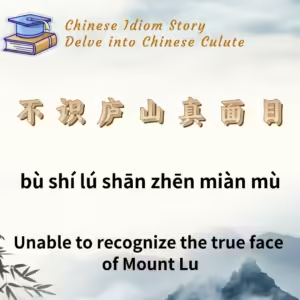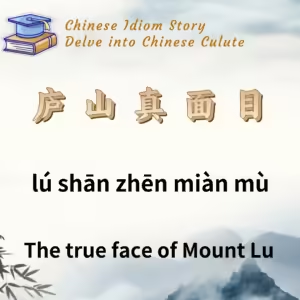
Chinese Idiom: 不识庐山真面目 (Bu Shi Lu Shan Zhen Mian Mu)
English Translation: Unable to recognize the true face of Mount Lu
pīn yīn: bù shí lú shān zhēn miàn mù
Idiom Meaning: This idiom means that when one is too close to a situation or too deeply involved, they may not be able to see the true nature or essence of the matter. It suggests that a broader perspective is often necessary to fully understand a situation.
Historical Source: The idiom originates from the poem “Tí Xī Lín Bì” (《题西林壁》) by the famous Northern Song dynasty poet Su Shi (Su Dongpo).
Idiom Story:
Mount Lu (庐山), located in the southern part of Jiujiang, Jiangxi Province, is a famous and majestic mountain in China. According to legend, during the Zhou dynasty, a hermit named Kuang Su lived on the mountain. When King Wu of Zhou attempted to invite Kuang Su to serve as an official, his envoys only found Kuang Su’s humble abode but never saw the man himself. Hence, the mountain was named “Mount Lu” after the hermit’s hut.
Mount Lu is renowned for its grandeur, with three sides facing the Yangtze River and the highest peak, Hanyang Peak, reaching over 1,400 meters above sea level. The mountain is covered with dense forests and deep ravines, and because of its proximity to the river and its high elevation, it is often shrouded in mist, making it difficult for people to discern its true shape and form.
In 1084, the great Northern Song poet and literary figure Su Shi visited Mount Lu. The mountain’s enchanting and ever-changing scenery deeply inspired him, leading him to write the famous quatrain “Tí Xī Lín Bì” (《题西林壁》). The poem reads:
横看成岭侧成峰,远近高低各不同。
不识庐山真面目,只缘身在此山中。
Translation:
From the front, it looks like a ridge; from the side, a peak,
Its shape changes with the distance and angle,
You cannot see the true face of Mount Lu,
Simply because you are within the mountain.
The poem’s meaning is that depending on the perspective—whether looking from the front, side, far away, or up close—the appearance of Mount Lu changes dramatically. The final two lines emphasize that one cannot fully grasp the mountain’s true form because they are within it, suggesting that one must step back to see the whole picture.
Over time, this poem inspired the idiom “不识庐山真面目,” which has come to symbolize the idea that being too deeply involved or too close to a situation can prevent one from understanding its true nature. It serves as a reminder of the importance of gaining perspective and seeing beyond the immediate or obvious.






